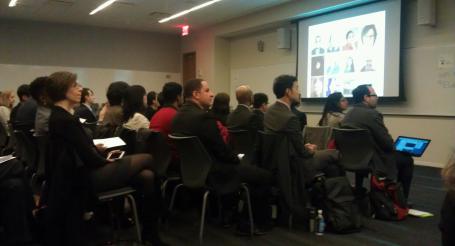Recently, hundreds of healthcare and biotech innovators, investors, entrepreneurs and stakeholders attended ElabNYC’s 2015 Pitch Day at the Microsoft Technology Center in the heart of Times Square. A total of twenty teams presented to a standing-room only crowd, with products and services addressing topics from preventing early childhood tooth decay, genomic analytics, protein engineering (related to scientific research/discovery, diagnosis and treatment of disease), managing addiction, to novel targeted approaches to treating breast, oral, prostate and pancreatic cancer.
The number of companies, as well as the wide swath of topics, represents the richness of the NYC ecosystem when it comes to healthcare and biotech entrepreneurs and innovation.
Eric Gertler, Executive Vice President and Managing Director for the Center for Economic Transformation at the NYCEDC, opened the event and spoke about the economic engine of entrepreneurship in NYC. He also touched upon two key unmet issues in the areas of life science and health information technology in NYC: (1) access to capital and (2) a need for wet lab space.
Initiatives to address these issues include the Alexandria Center for Life Sciences, the NY Genome Center, BioBAT at SUNY Downstate, Harlem Biospace, Kiiln NYC and the work of ELab. Additionally, on April 1, the NYCEDC recently announced a $150 million Early-Stage Life Sciences Funding Initiative, a private-public funding partnership that includes the NYCEDC, Celgene, Eli Lilly, GE Ventures, Flagship Ventures and ARCH Venture Partners, as well as a major expansion of space at the Alexandria Center.
Mary Howard, the Program Manager at ElabNYC, spoke about the successes of Elab alumni. Portfolio companies have earned licensing deals, further institutional investment deals, NIH innovation grants, and funding from such organizations as the AHA, the Robertson Foundation and the Bill and Melinda Gates Foundation.
The following is a list of all twenty companies from the class of 2015:
- ARL Designs (CUNY affiliation): Super-hydrophobic Virtual-Well Microplates Enabling Accurate Nanoliter Dispensing for High Throughput/Content Screening at Low Cost. They’ve developed an nDAP (nanodroplet array plate), which allows for the analysis of an array of individual cells in 3D and over time. Additionally, cells can be retrieved at any time for further analysis.
- Brooklyn Biosciences (NYU affiliation): They’ve developed a novel protein that significantly increases the efficiency of transfection reagents, which scientists use to deliver DNA and RNA into cells.
- NY Protein Biologics (Columbia affiliation): They’ve developed patent-pending protein technologies, inclusive of those related to protein engineering and gene optimization to maximize protein expression.
- Optologix (CUNY affiliation): They’ve developed a research tool that uses blue light instead of chemicals/traditional agents to regulate the production of proteins.
- NoMoCan (SUNY affiliation): They’re developing a targeted therapy (a monoclonal antibody) that selectively and specifically finds and kills pancreatic cancer cells.
- Sveikatal (Weill Cornell affiliation): They’ve developed a therapy for oral cancer using a novel retinoid (Vitamin A) therapy.
- Zakan Therapeutics (Einstein affiliation): They’ve developed a “bio missile” designed to bypass healthy cells and attack and deliver anti-cancer compounds directly to metastatic cancer cells.
- MedHexim1 (SUNY affiliation): They’re developing a diagnostic test and therapy for prostate cancer focused on Hexim1 as a biomarker/target.
- PHD Biosciences (NYU affiliation): They’re working on an oral nanomedicine, a transition state inhibitor for triple negative breast cancer (lack the 3 most common hormonal receptors that fuel breast cancer, and thus hormonal treatment is not effective).
- Avalia Immunotherapies (Einstein affiliation): They’re developing immuno-oncology therapies for the treatment of cancer (i.e. prostate cancer), inclusive of using a therapeutic vaccine or immunomodulator using the patient’s own immune system to kill cancer cells.
- Yiviva (Yale affiliation): They’re developing high-quality, evidence-based botanicals (phytomedicines) to address age-associated diseases. They’ve also developed a proprietary database.
- MySmileBuddy (Columbia affiliation): They’ve developed a tablet-based educational and action plan technology that helps parents and community health workers manage the risks for early childhood tooth decay.
- Genetical Lens (Independent): They’ve developed Well-Child Lens, a video-enhanced mobile application designed help both parents and doctors streamline all aspects of autism screening and surveillance for toddlers. They are expanding to ages from birth to five-years-old and are including other behavioral disorders.
- Addicaid (Independent): A social recovery platform and resource for recovering addicts and alcoholics. On the enterprise end, data insights, improved coordination and a potential reduction of aftercare and operational costs. Substance abuse is one of the ten elements of essential health benefits covered under the Affordable Care Act.
- Scalable Genomics (NYU affiliation): They’ve developed Big Data bioinformatics analytics software that can be used on clinical, environmental, genomic and forensic samples.
- Hyperfine (Independent): They’ve developed advanced analytics software for personalized medicine (use of an individual’s personal genetic profile to help guide preventative, diagnostic and therapeutic healthcare decisions).
- Innovative Neurons (Independent/Zahn Center): They’re aiming for a FAST (Fast, Accessible, Safe, Technology) medical device called the Retractable Multi-needle Syringe, designed to enhance safety and help prevent needlesticks -a concern of healthcare workers that work with sharps.
- InfrasSonic Monitoring (SUNY affiliation): They’ve developed a noninvasive heart-monitoring device to provide high-quality information in nonclinical settings.
- S.A.L.T. (Weill Cornell affiliation): They’ve developed a mobile app, which used in conjunction with urine test strips, is a point-of-care tool that tracks salt levels in urine at home, a measurement used in looking at kidney disease.
- PainQX (NYU affiliation): They’ve developed algorithmic software that provides an objective way to measure pain in humans and animals. EEG-based, leads to pain score.
For more in-depth information on the companies and the work of ElabNYC, be sure to check out their web site here: http://elabnyc.com/participants/



